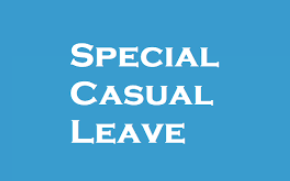
SPECIAL CASUAL LEAVE
Special Casual Leave (SCL) is one of the significant yet often misunderstood provisions available to Central Government employees. According to the Swamy’s Handbook 2025, which remains the most authentic and updated reference for service rules, Special Casual Leave is an additional leave granted for specific purposes not covered under the general casual or earned leave categories. It is a leave of grace, granted at the discretion of the competent authority, and it serves as a recognition of the diverse roles and responsibilities of government servants beyond their routine official duties.
Unlike regular casual leave, which is sanctioned for general purposes such as personal errands or short-term absences, Special Casual Leave is sanctioned for particular reasons of national, social, health, or departmental interest. The 2025 edition of Swamy’s Handbook outlines detailed provisions and updated conditions under which SCL can be granted, including for participating in sports, attending training, responding to emergencies, family welfare programs, and other government-sanctioned engagements.
The foremost criterion for availing SCL is that it should be for purposes beyond an employee’s control or for activities that bring credit to the department or government. The most common use of Special Casual Leave is for employees who are selected to represent their organization or the country in national or international sports events, cultural competitions, training camps like NCC or Scouts, and official seminars. In such cases, the duration of the event, including travel time, is generally sanctioned as SCL, and the period does not get deducted from the regular leave account.
Swamy’s Handbook 2025 continues to maintain provisions for SCL in cases of natural calamities or emergencies. For example, if an employee is unable to attend duty due to floods, earthquakes, or widespread transportation strikes beyond their control, Special Casual Leave may be sanctioned upon submission of satisfactory evidence. The maximum period for such cases is not pre-defined and is decided based on the merit of the case and the discretion of the authority.
Another essential aspect where SCL is permitted is in the case of family welfare measures. Central Government male employees undergoing vasectomy are entitled to six working days of SCL, while female employees undergoing tubectomy can get up to fourteen working days. In cases of complications, additional SCL can be granted based on medical certification. Further, if the spouse of a male employee undergoes the procedure and the employee needs to accompany or care for her, a limited period of SCL can also be sanctioned.
Employees engaged in organizing or attending government-recognized workshops, election duties, training under Skill India, yoga programs under Ayush Ministry, and awareness campaigns under Swachh Bharat Abhiyan can also claim SCL. Such leaves are granted for the actual period of participation and are treated with importance as they contribute to the government’s larger development objectives. However, documentary proof is a must, and prior sanction is advised unless the situation is emergent.
It is crucial to understand that Special Casual Leave is not a matter of right. The controlling officer or competent authority holds the discretion to approve or reject the request based on the necessity, merit, and supporting documents provided. Additionally, SCL cannot be combined with other types of leave like Earned Leave, Half Pay Leave, or even general Casual Leave without prior approval. Also, the use of SCL to create long weekends by combining it with public holidays is discouraged unless explicitly sanctioned.
One of the unique characteristics of SCL is that it is not credited to the leave account of the employee, nor can it be carried forward or encashed. It is a case-specific leave, entered separately in the service records for auditing and verification. The maximum number of days for which Special Casual Leave can be availed varies depending on the purpose. However, in most cases, it is expected that the total number of days under SCL and Casual Leave combined should not exceed 30 days in a calendar year.
The Handbook also reiterates that Special Casual Leave will not be granted for participation in strikes, political agitations, or activities against the interest of the government. Misuse or false representation in obtaining SCL is treated seriously and may lead to disciplinary action. Employees are advised to use this provision responsibly and ensure transparency in submitting leave applications.
In recent developments reflected in the 2025 edition of Swamy’s Handbook, digital applications through e-office systems have become the norm for tracking and processing SCL requests. This brings more transparency and quicker decision-making, though it also means that employees must ensure proper documentation and timely application.
In conclusion, Special Casual Leave is a flexible and considerate provision under the Central Government service rules that supports employees in fulfilling responsibilities beyond their formal office duties. It underscores the government’s recognition of the diverse contributions its employees make in various spheres—be it sports, community engagement, family welfare, or public interest. When used correctly and responsibly, Special Casual Leave strengthens the morale of employees and fosters a culture of commitment both inside and outside the workplace.
Please don’t forget to leave a review.

Disclaimer:
This blog post is intended for informational purposes only. All rights, references, and credits related to official government service rules and guidelines belong to Swamy’s Publications, the authoritative source on these matters. We acknowledge and extend our courtesy to Swamy’s Publication for their valuable work in compiling and publishing official content. This blog does not claim ownership or authorship of any content originally published by Swamy’s Publications.
For more information and updates please follow the page and don’t forget to leave your comment.
